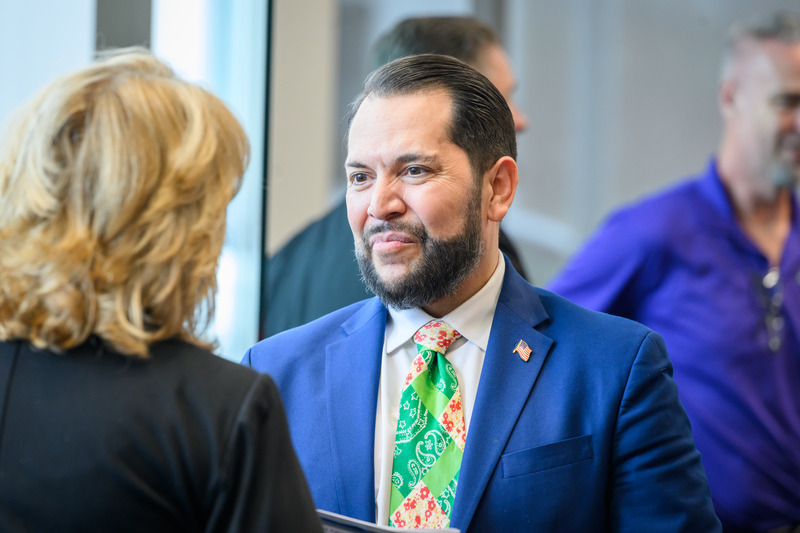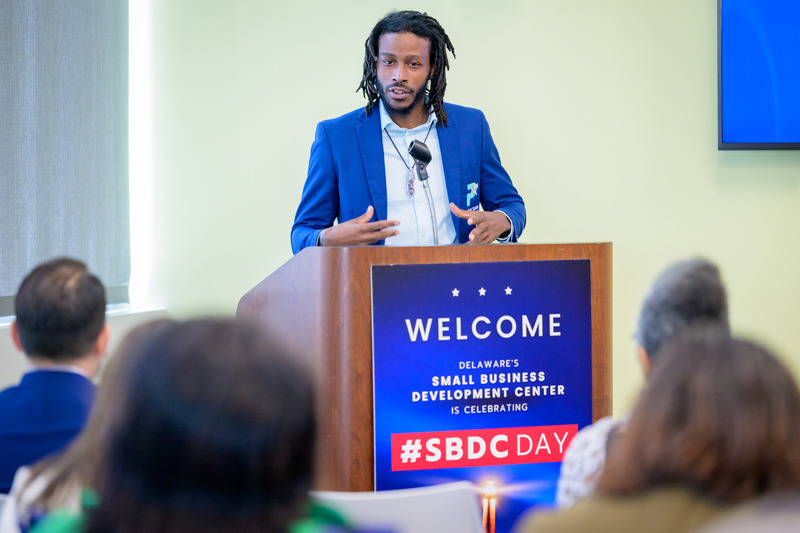


Supporting entrepreneurs
Photos by Evan Krape April 16, 2024
Delaware Small Business Development Center helps small businesses secure funding and training they need to succeed
Small business owners are under a lot of pressure these days. Consider the small businesses in Baltimore, Maryland, that are coping with the aftereffects from the Francis Scott Key Bridge collapse on March 26.
For example, where is a small business to turn for help if it can’t make payroll that is tied to port operations or needs to replenish — and pay for — inventory that it already had budgeted and assumed the cost of once, but now might never arrive?
Small Business Development Centers (SBDCs) are a key support system for situations like this.
SBDCs work to help small businesses secure funding and training they need to succeed. This can include adapting to realities like inflation, building a proper business plan, securing credit, finding employees and even weathering unexpected events like a bridge collapse.
Delaware’s Small Business Development Center (Delaware SBDC) is housed at the University of Delaware and is a unit of the Office of Economic Innovation and Partnerships. As such, Delaware SBDC supports small businesses in the state, helping to drive innovation and power the state's economy.
Last month, Delaware SBDC brought together federal small business leaders, local partners and small business clients to celebrate the 1,000 centers doing similar work across the nation for SBDC Day 2024 on March 20. The event, held at the FinTech Innovation Hub on UD’s Science, Technology and Advanced Research (STAR) Campus, included a very special guest — Mark Madrid, associate administrator for the U.S. Small Business Administration’s Office of Entrepreneurial Development.
Madrid shared in remarks that he is a third-generation Mexican American from a farming community in the Texas Panhandle. His father worked in the cotton industry but saw an opportunity to create something different through entrepreneurship. So, his parents started a welding business during Madrid’s childhood, leading to many family lessons in grit and determination.

Today, Madrid spends his days fighting for U.S. small businesses to have the resources and support to survive.
“We should not turn our back on any small business,” Madrid said. “Mustard seeds are the smallest of seeds but if they are planted correctly and nourished and cultivated, they become a beautiful brush of trees that have beautiful branches where the birds perch.”
In the same way, Madrid continued, Delaware SBDC’s efforts to nurture small businesses with services and compassion have the power to instill confidence as business owners get going and ultimately help drive the economy forward.
“Today was the fuel that not only I needed, but that Washington needs,” Madrid said. “What I see here today is excellence.”
Nurturing dreams
Following Madrid’s remarks, Delaware SBDC Associate State Director Sarah Mailloux invited several small business owners to share their experiences.
“One of the things that lifts us all up on SBDC Day is recognizing our clients who have worked with us and had an impact on their local community,” Mailloux said. As they spoke, the room echoed at times with cheers, laughter and murmurs of acknowledgement about the challenges that come with launching and maintaining a business.
Christopher Boozer is the founder of The Trash Porter, a waste removal company in Wilmington, Delaware, that specializes in doorstep garbage collection for apartment residents. Through Delaware SBDC, Boozer has taken classes, competed — and won — business funding in pitch competitions, and developed a solid business plan.
“I didn’t even know what a business plan was — I just wanted to take the trash out,” said Boozer, who will celebrate his company’s first anniversary in June. “SBDC has been my foundation and gave me that confidence Mark was talking about. Being in this entrepreneurial community and being part of THE community is the greatest thing.”

Gertha “Gigi” Jean, CEO and risk adviser of One-Way Insurance, can relate.
Jean and her husband, Ebens, started their multilingual insurance firm in Seaford, Delaware, to help small businesses navigate their insurance needs. Little did they know it would be a rocky start when they opened a mere nine months before the 2020 coronavirus pandemic took hold in the U.S.
Lack of funding, a global shutdown and an uncertain future could have left the Jeans discouraged. Instead, they worked with their SBDC adviser to stay on track and applied for funding to expand their business. The result was a successful Delaware Edge Grant application that allowed them to equip a mobile insurance van, complete an office renovation and hire new staff.
“So many of us are starting businesses with no inheritance, don’t know what to do, we’re just taking a risk on a dream that might never happen. Having a partner like SBDC by our side is amazing,” Jean said.
Growing futures
A common thread among the stories told March 20 were about SBDC’s efforts to help businesses adapt and keep going.
Social entrepreneur Markevis Gideon encountered funding challenges at various time points over his company’s history — even when the company was pulling in $1.85 million in annual revenue.
“Unfortunately, with a lot of traditional banks, it’s hard for the marginalized community. Even with a 750+ credit score, I couldn’t get a $50,000 credit loan,” said Markevis, founder of NERDiT Now, a Delaware-based technology repair service.
In Delaware, over 63% of the businesses served by Delaware SBDC are minority owned and 55% are women-owned. Combined, this represents over 80% of Delaware SBDC’s client base. Without Delaware SBDC’s intervention and support, that could be a lot of untapped potential.
Delaware SBDC staff work tirelessly to ensure this isn’t the case, Mailloux said. Over the past two years, staff have facilitated 88 new business starts, counseled over 1,500 clients and hosted nearly 240 events, including training for more than 4,000 people. In that same time period, staff have helped small business clients secure $51 million in capital to further their business plans, according to the Delaware SBDC 2024 annual report.
Among these new business owners is Rosie Tooley, a retired educator and current executive director of Lazarus Educational Services, Inc., an organization that provides entrepreneurial business training for veterans and individuals in reentry. Barely a year old, Lazarus already has graduated three clients, two of which had a combined 60 years of incarceration prior to reentry. With Tooley’s help, her clients are carving a new path and shaping a future that looks bright.
“How empowering it is for them, for me and for the SBDC to see the tables turn … from imprisonment to working to fulfill their business dreams,” Tooley said. “This impacts them, but also their families and their community.”
Contact Us
Have a UDaily story idea?
Contact us at ocm@udel.edu
Members of the press
Contact us at 302-831-NEWS or visit the Media Relations website

